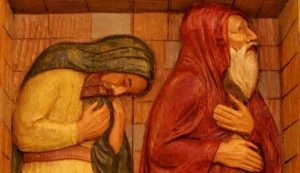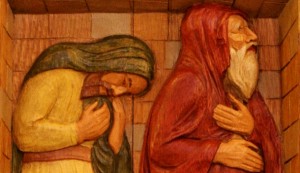
Central Idea: God is just and merciful. Doctrine: Justification. Practical Application: A life of justice and mercy
To view Lectionary 150, click here.
Central Idea: God is just and merciful
Reading 1 Sir 35:12-14, 16-18
The LORD is a God of justice,
who knows no favorites.
Though not unduly partial toward the weak,
yet he hears the cry of the oppressed.
The Lord is not deaf to the wail of the orphan,
nor to the widow when she pours out her complaint.
The one who serves God willingly is heard;
his petition reaches the heavens.
The prayer of the lowly pierces the clouds;
it does not rest till it reaches its goal,
nor will it withdraw till the Most High responds,
judges justly and affirms the right,
and the Lord will not delay.
- God is just so he has a special concern for the weak, the oppressed, the orphan and widow, and anyone who serves him willingly.
- These persons form one class: the lowly. They suffer from injustice the most, spurring God’s just response.
Responsorial Psalm Ps 34:2-3, 17-18, 19, 23
R. The Lord hears the cry of the poor.
I will bless the LORD at all times;
his praise shall be ever in my mouth.
Let my soul glory in the LORD;
the lowly will hear me and be glad.The LORD confronts the evildoers,
to destroy remembrance of them from the earth.
When the just cry out, the Lord hears them,
and from all their distress he rescues them.The LORD is close to the brokenhearted;
and those who are crushed in spirit he saves.
The LORD redeems the lives of his servants;
no one incurs guilt who takes refuge in him.
- God saves those who ask him to: those who suffer and those who serve him.
- In the atonement, Our Lord has taken all human suffering to himself, including it in his sacrificial offering which redeems the world.
Reading 2 2 Tm 4:6-8, 16-18
Beloved:
I am already being poured out like a libation,
and the time of my departure is at hand.
I have competed well; I have finished the race;
I have kept the faith.
From now on the crown of righteousness awaits me,
which the Lord, the just judge,
will award to me on that day, and not only to me,
but to all who have longed for his appearance.At my first defense no one appeared on my behalf,
but everyone deserted me.
May it not be held against them!
But the Lord stood by me and gave me strength,
so that through me the proclamation might be completed
and all the Gentiles might hear it.
And I was rescued from the lion’s mouth.
The Lord will rescue me from every evil threat
and will bring me safe to his heavenly kingdom.
To him be glory forever and ever. Amen.
- Paul has been a faithful servant of God, has suffered in this service, and is not done suffering yet. He is confident that “the Lord, the just judge” will bring him “safe to his heavenly kingdom” as a reward.
Gospel Lk 18:9-14
Jesus addressed this parable
to those who were convinced of their own righteousness
and despised everyone else.
“Two people went up to the temple area to pray;
one was a Pharisee and the other was a tax collector.
The Pharisee took up his position and spoke this prayer to himself,
‘O God, I thank you that I am not like the rest of humanity —
greedy, dishonest, adulterous — or even like this tax collector.
I fast twice a week, and I pay tithes on my whole income.’
But the tax collector stood off at a distance
and would not even raise his eyes to heaven
but beat his breast and prayed,
‘O God, be merciful to me a sinner.’
I tell you, the latter went home justified, not the former;
for whoever exalts himself will be humbled,
and the one who humbles himself will be exalted.”
- Luke’s comment makes the meaning of Christ’s parable clear: If you are convinced you are holy but look down on everyone else as a lost sinner, then you are a fool in great danger.
- Yet each one of us lives out this parable. Our true condition is that each of us is a poor sinner in need of God’s mercy. Yet admitting our misery is abhorrent to us, so we try to convince others and ourselves that we are just.
- The Holy Spirit can slowly show us what we are. This is painful but it reveals us to ourselves as actually widows, orphans, poor, brokenhearted, oppressed, and in need of justification.
- This breaking down process opens us up to serve God in justice so God will stand beside us, as he did for St. Paul, and bring us safely to heaven.
Doctrine: Justification
- According to Fr. John Hardon’s Modern Catholic Dictionary, divine justice is “The constant and unchanging will of God to give everyone what is due him or her.”
- The great work of divine mercy accomplished by Our Lord is our justification. Justification is being brought back into friendship with God through the forgiveness of our sins and our adoption as children of God. According to the Council of Trent, “Justification is not only the remission of sins, but also the sanctification and renewal of the interior man” (CCC 1989).
- Justification is a life-long process of “cooperation between God’s grace and man’s freedom” (CCC 1993). We cannot be what God wants us to be without God’s help. Yet cannot be what God wants us to be unless we continually say yes to what God wants. And our yeses are in words and deeds.
- The grace of the Holy Spirit, conferred on us through faith and Baptism, gives us God’s righteousness (CCC 2017). “Moved by grace, man turns toward God and away from sin, and so accepts forgiveness and righteousness from on high” (CCC 2018). This act of justification forgives our sins, makes us holy, and inwardly transforms us (CCC 2019). All this happens through the merits of Christ (CCC 2020).
Practical Application: A life of justice and mercy
- In our part of the “cooperation between God’s grace and man’s freedom,” we remain and grow in justification by living the virtue of justice, or giving every person what we owe him.
- God is a person, and we owe him adoration, thanks, reparation, and petition. We also owe him fulfilling our obligations to our neighbor.
- Our life is full of obligations to our neighbor.
- If we are unjust to our neighbor, we cannot be in a state of justice with God.
- This is why Our Lord said, “So if you are offering your gift at the altar, and there remember that your brother has something against you, leave your gift there before the altar and go; first be reconciled to your brother, and then come and offer your gift” (Mt 5:23-24).
- If we lose the state of grace (that is, lose being in a state of justice or friendship with God through his gifts and our cooperation), we can recover our justification through the sacraments of healing, especially Confession. However, we cannot be forgiven unless we forgive those who offend us.
- In addition to giving others what we own them, we also must live lives of mercy. This means giving (in the language of stewardship) our time, talents, and treasure.
- Thus, as children of God, we owe others justice and mercy.
The Homiletic Directory also suggests these Catechism points and themes for preaching for the Thirtieth Sunday in Ordinary Time:
- CCC 588, 2559, 2613, 2631: humility as the foundation of prayer
- CCC 2616: Jesus hears prayer made in faith
- CCC 2628: adoration as the attitude of man who knows he is a creature
- CCC 2631: prayer for pardon as the first kind of prayer of petition

Leave a Reply